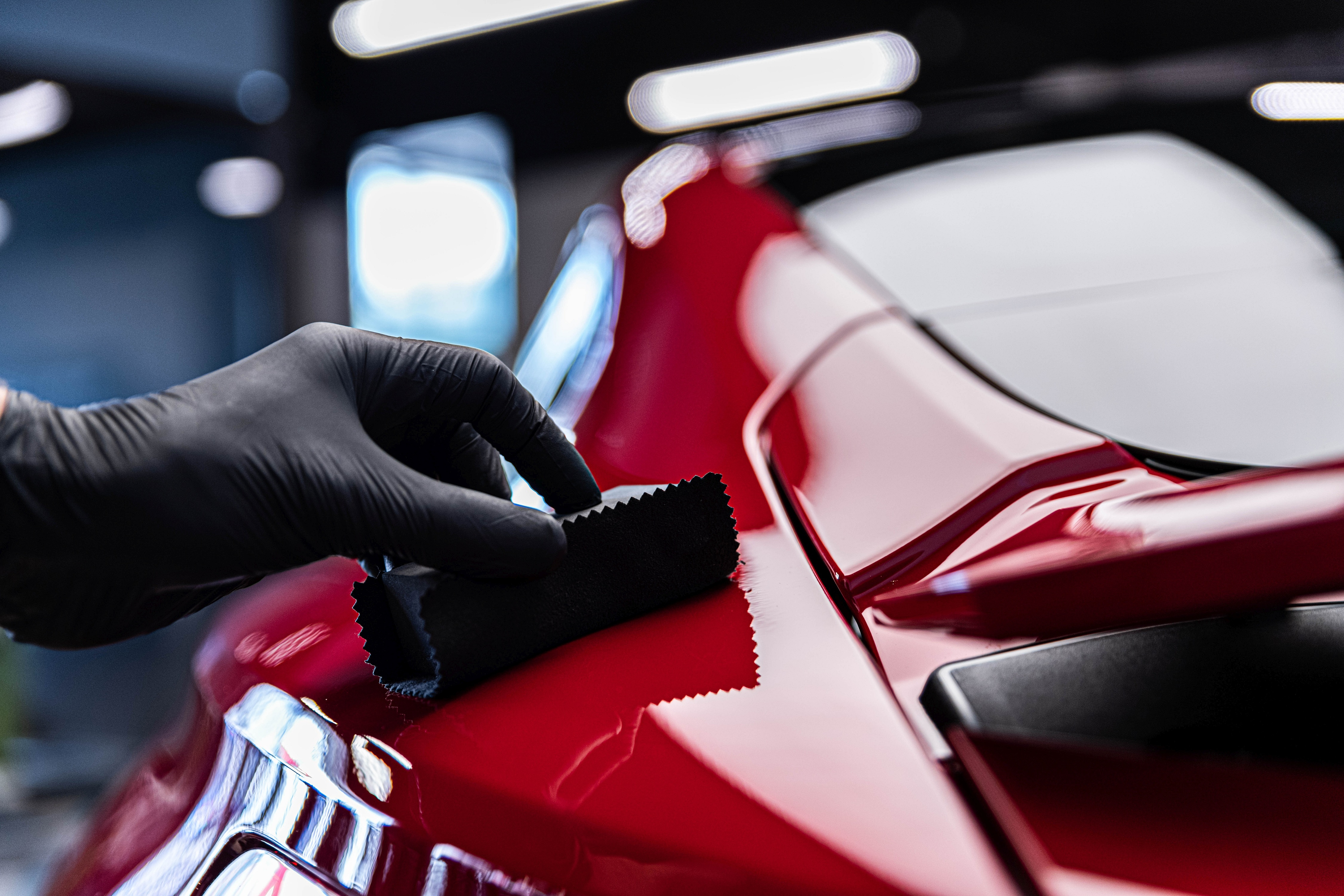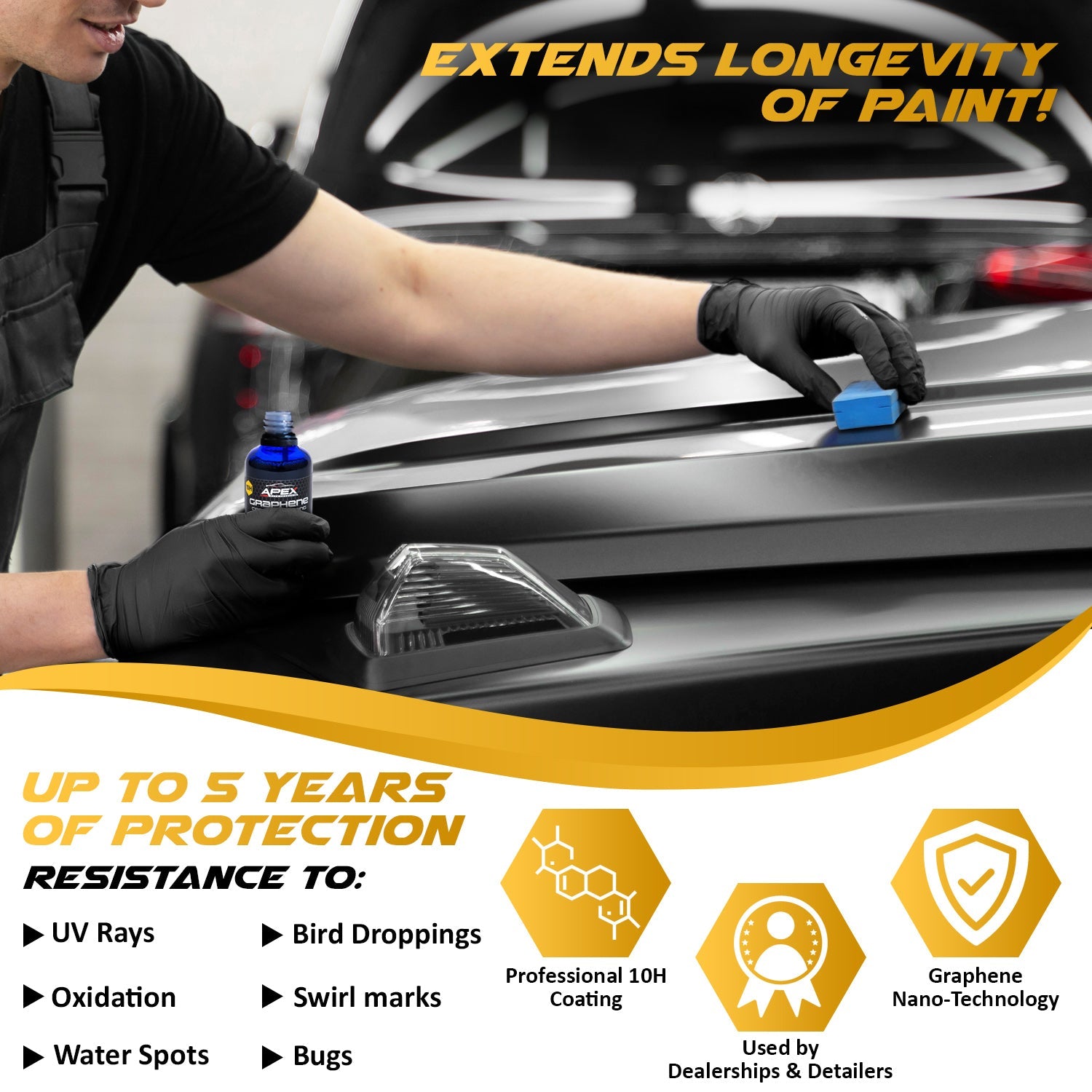Final Touch Auto Works Ceramic Coatings vs. DIY Kits: What You Need to Know
Final Touch Auto Works Ceramic Coatings vs. DIY Kits: What You Need to Know
Blog Article
The Ultimate Overview to Ceramic Coatings: Enhancing Your Automobile's End up and Resilience
If you're seeking to boost your automobile's look and defense, ceramic coverings could be the solution you've been looking for. These sophisticated finishes bond with your lorry's paint, creating a durable barrier against environmental damage. Just how do they pile up versus standard wax? Recognizing the advantages and application procedure can make a substantial distinction in your auto treatment regimen. Let's explore what makes ceramic layers a beneficial investment for your car.
What Are Ceramic Coatings?
Ceramic coverings are sophisticated protective layers that boost your vehicle's exterior. They're made from a liquid polymer that chemically bonds with your lorry's paint, developing a sturdy guard. Unlike standard wax or sealants, which diminish in time, ceramic coverings provide long-lasting defense versus environmental contaminants like UV rays, dust, and chemicals.When you use a ceramic finish, you're purchasing a barrier that repels water, making it easier to cleanse your auto and maintaining it looking newer for longer. This modern technology aids protect the stability of your paint, reducing the threat of scrapes and oxidation.Ceramic coverings come in numerous solutions, each developed to cater to various demands and preferences. You can pick a do it yourself kit or select expert application, relying on your comfort degree and budget plan. Overall, ceramic coatings stand for an advanced solution for preserving your vehicle's visual appeal and long life.
Benefits of Ceramic Coatings
You reveal a variety of advantages that go beyond simple aesthetics when you spend in a ceramic coating. To start with, it provides outstanding protection versus ecological pollutants like dust, bird droppings, and UV rays, keeping your auto's paint looking new much longer. You'll discover that maintenance comes to be simpler, as the hydrophobic residential properties trigger water and gunk to glide off effortlessly. This indicates much less time invested washing and outlining your vehicle.Additionally, ceramic coatings can enhance the glossiness of your auto's finish, providing it that showroom sparkle. They additionally offer resistance to scratches and swirl marks, which aids maintain your lorry's resale value. With a ceramic coating, you're not simply safeguarding your investment; you're likewise improving its total look and longevity. Ultimately, this sophisticated innovation warranties your car stands out while taking pleasure in lasting advantages that typical waxes merely can not match.
The Application Process: How to Apply Ceramic Coatings
Applying a ceramic finishing entails numerous crucial actions to guarantee optimal results. Initially, completely wash your cars and truck to eliminate any type of dirt, crud, or impurities. This ensures the surface area is tidy and prepared for the finishing. Next, decontaminate the paint using a clay bar to eliminate embedded particles. Later, evaluate the paint for blemishes and brighten it to accomplish a smooth surface.Once your vehicle's surface is prepped, apply the ceramic covering in tiny areas. Utilize an applicator pad to spread the layer uniformly, complying with the producer's instructions. Permit the finishing to heal for the suggested time, usually between one to 2 hours, depending on the product.Finally, stay clear of washing your vehicle for at the very least a week to allow the coating bond effectively. Complying with these steps will help you accomplish a resilient, high-gloss coating that safeguards your car for several years to find.

Comparing Ceramic Coatings to Typical Wax
After ensuring your vehicle's surface area is completely prepped with a ceramic coating, it's time to ponder exactly how this modern-day service piles up against standard wax. Ceramic finishings offer a robust layer of defense that lasts for several years, while wax normally offers just a couple of weeks of sparkle. You'll observe that ceramic coverings bond with your paint, developing a hydrophobic surface that pushes back water and dust, making upkeep easier.In comparison, typical wax sits on top of the paint and requires regular reapplication. With ceramic coatings, you get premium scratch resistance and UV security, aiding to avoid fading and oxidation. While the preliminary financial investment for a ceramic coating is higher, the long-term benefits typically exceed the expenses. So, if you're seeking resilience and enhanced gloss, ceramic finishings are a wise option over traditional wax.
Upkeep Tips for Your Ceramic Layered Automobile
To maintain your ceramic-coated automobile looking immaculate, routine upkeep is crucial. Beginning with a mild clean making use of a pH-balanced hair shampoo; stay clear of severe detergents that can degrade the coating. Use a microfiber clean glove to stop scratches and always wash extensively to eliminate any soap residue.After washing, completely dry your auto with a soft microfiber towel to stay clear of water areas. Consider using a ceramic upkeep spray every few months to boost the finish's hydrophobic residential properties and include an extra layer of protection.It's additionally smart to avoid automated automobile washes with unpleasant brushes, as they can damage the coating. Rather, choose hand cleans or touchless laundry options. In addition, regularly check your car for impurities like tree sap or bird droppings and address them promptly to protect against etching. Adhering to these pointers will certainly aid maintain the shine and toughness of your ceramic-coated lorry for years to come.
Typical Misconceptions About Ceramic Coatings
Regardless of the outstanding advantages of ceramic coverings, numerous misconceptions can produce complication for car proprietors. One usual false impression is that ceramic finishings remove the requirement for upkeep. While they do provide boosted protection, routine cleaning and care are still vital to preserve that high-gloss finish.Another misconception is that these finishings are scratch-proof. While they give a strong layer of protection versus minor scrapes, they can't stand up to extreme influences or abrasive materials.Many additionally believe that ceramic finishings will certainly make their cars and trucks unsusceptible to all contaminants. In truth, they push back dust and water but won't stop concerns like bird droppings or tree sap from causing damage if left unattended.Lastly, some think that using ceramic layers is a DIY job any person can handle, but achieving a perfect application usually requires expert proficiency to ensure peak outcomes.
Selecting the Right Ceramic Finishing for Your Cars and truck
Just how do you pick the visit here appropriate ceramic layer for your car? Begin by thinking about the level of protection you require. If your car faces harsh weather or regular roadway journeys, decide for a premium layer that supplies exceptional sturdiness and resistance to scratches, UV rays, and chemical stains.Next, think of the application method. Some finishes call for professional installation, while others are DIY-friendly. If you're click for info experienced, a do it yourself product may conserve you money, but also for the most effective results, a specialist can guarantee appropriate application.Don' t fail to remember to examine the longevity of the coating. Some last a couple of years, while others can protect for a years or more. Read reviews and testimonials to evaluate individual satisfaction. By evaluating these factors, you'll discover a ceramic coating that not only boosts your vehicle's look yet also supplies long-lasting security.
Regularly Asked Questions
For How Long Do Ceramic Coatings Last on Typical?
Ceramic coatings usually last anywhere from 2 to five years, relying on elements like application, upkeep, and environmental problems. You'll intend to follow appropriate care regimens to maximize their longevity and efficiency.
Can Ceramic Coatings Be Applied Over Paint Scratches?
You can not apply ceramic finishes over paint scratches successfully. It's ideal to repair any scrapes first, guaranteeing a smooth surface - Final Touch Auto Works Ceramic Coatings. In this manner, the finishing bonds properly and supplies ideal security for your lorry's surface
Are Ceramic Coatings Safe for All Auto Surface areas?
Ceramic coatings are generally safe for most car surface areas, consisting of paint, glass, and wheels. Nonetheless, it is critical to examine details item guidelines, as some finishes may not be appropriate for specific materials or finishes.

Will Ceramic Coatings Protect Versus UV Damage?

Can I Do Touch-Ups on Ceramic Covered Surface Areas?
You can do touch-ups on ceramic covered surface areas, but it's essential to make use of compatible items. Verify the location is tidy and comply with proper application methods to maintain the coating's honesty and performance. Unlike traditional wax or sealers, which wear off over time, ceramic coverings give durable protection versus ecological impurities like UV rays, dust, and chemicals.When you apply a ceramic finishing, you're investing in an obstacle that pushes back water, making it less discover here complicated to cleanse your automobile and maintaining it looking newer for longer (Final Touch Auto Works Ceramic Coatings). Later, check the paint for flaws and polish it to attain a smooth surface.Once your auto's surface area is prepped, apply the ceramic finish in small areas. Permit the covering to treat for the suggested time, generally in between one to 2 hours, depending on the product.Finally, prevent cleaning your vehicle for at the very least a week to let the coating bond effectively. Take into consideration using a ceramic upkeep spray every few months to improve the finishing's hydrophobic properties and include an extra layer of protection.It's additionally smart to prevent automatic automobile washes with abrasive brushes, as they can harm the layer. Ceramic finishings are generally risk-free for the majority of vehicle surface areas, consisting of paint, glass, and wheels
Report this page